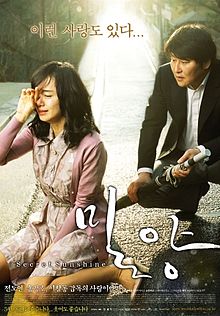 It often feels like mentally disturbed people are a recurring trope in Korean dramas. It may not be seem front-and-center in Secret Sunshine but Jeon Do-yeon’s Lee Shin-ae does spend most of the film in a fugue state that leads her to make an escalating series of questionable decisions.
It often feels like mentally disturbed people are a recurring trope in Korean dramas. It may not be seem front-and-center in Secret Sunshine but Jeon Do-yeon’s Lee Shin-ae does spend most of the film in a fugue state that leads her to make an escalating series of questionable decisions.
Her lack of mental stability is hinted at right from the start. Following the death of her husband due to an apparent accident, Lee brings her son with her to start a new life in the small town of Miryang. When asked, she says that she picked Miryang simply because it is her husband’s hometown though she has never been there. One of the first people she meets is the owner of a boutique to whom she offers the unsolicited advice that the shop needs a new coat of paint.
Her mental deterioration accelerates when her son is kidnapped. Perhaps at this point one ought to sympathize with her lot in life but director Lee Chang-dong portrays her plight from such a remove that it is impossible to really do so. Her character is as much a mystery to the audience as the people around her. Perhaps this is intended. Crazy people don’t really know what they want after all. Jeon Do-yeong’s acting is fine and deserves the praise it received. But the script and direction is such that it’s hard for the audience to feel emotionally engaged with such a distant character.
This is exacerbated by the lack of strong supporting characters. Song Kang-ho’s immense talent is wasted here in a role that seems almost superfluous. My wife offered the intriguing suggestion that his Kim Jong-chan is perhaps meant to be the titular secret sunshine, the constant source of joy and support even if he is unnoted and unreciprocated. This would make a lot of dramatic sense but if this was the director’s intent, I’d say he failed in its execution. Lee is so apathetic towards Kim that their relationship is entirely one-sided. You never get a good sense of why Kim acts the way he does and Lee never once acknowledges his support.
I do have to say that the atheist in me was delighted with the Christianity arc in the film. Lee’s sense of being betrayed by God is a surprisingly insightful observation on the contradictions inherent in Christianity and a rather brave one as well, given that the majority of South Koreans are Christians.
But neither this bit nor Jeon’s acting is enough to save Secret Sunshine. It is ultimately a weak, unfocused film that has too little to say and takes far too long to say it. I’d say give this one a miss.